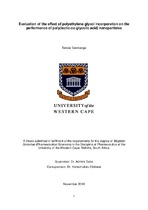| dc.contributor.advisor | Dube, Admire | |
| dc.contributor.author | Samkange, Tendai | |
| dc.date.accessioned | 2018-07-25T11:18:43Z | |
| dc.date.available | 2018-08-31T22:10:06Z | |
| dc.date.issued | 2016 | |
| dc.identifier.uri | http://hdl.handle.net/11394/6112 | |
| dc.description | Magister Scientiae - MSc (Pharmaceutical Chemistry) | |
| dc.description.abstract | Nanoparticle drug delivery is challenged by the binding of proteins in
blood which result in their rapid removal from the circulatory system. Nanoparticles
engineered to delay protein binding have shown to have extended circulatory times.
One such engineering technique is PEGylation, which is the coating of nanoparticles
with polyethylene glycol (PEG). PEG shields the nanoparticle from adhesive
interactions with proteins. However, the optimal PEG content required to impart this
"stealth" property onto poly(lactic-co-glycolic acid) (PLGA) nanoparticles, is unknown.
Moreover, the effect of PEGylation on drug release has not been thoroughly
investigated. | |
| dc.language.iso | en | |
| dc.publisher | University of the Western Cape | |
| dc.title | Evaluation of the effect of polyethylene glycol incorporation on the performance of poly(lactic-co-glycolic acid) nanoparticles | |
| dc.rights.holder | University of the Western Cape | |

